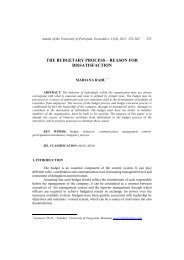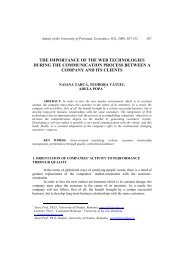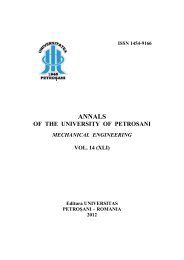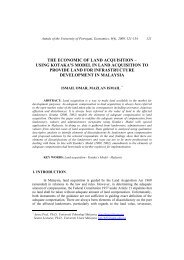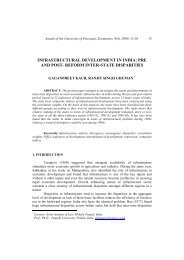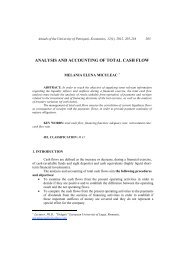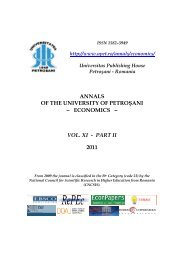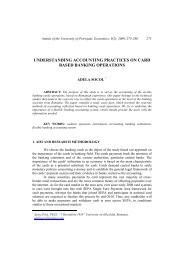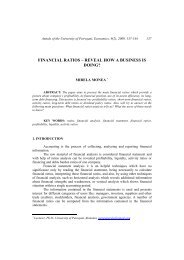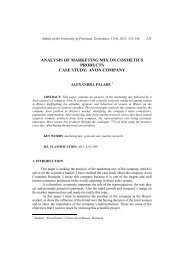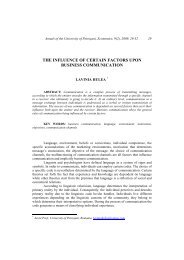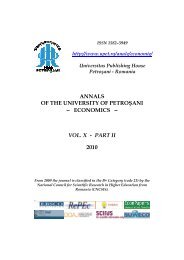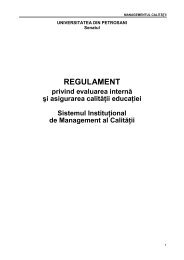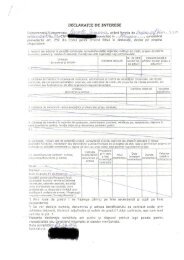annals of the university of petroÅani â¼ economics â¼ vol. xi - part i ...
annals of the university of petroÅani â¼ economics â¼ vol. xi - part i ...
annals of the university of petroÅani â¼ economics â¼ vol. xi - part i ...
You also want an ePaper? Increase the reach of your titles
YUMPU automatically turns print PDFs into web optimized ePapers that Google loves.
Guiding Marks Regarding <strong>the</strong> Reasoning <strong>of</strong> Scientific Research in … 55<br />
These principles lend to <strong>the</strong> strategy <strong>of</strong> <strong>the</strong> scientific research <strong>vol</strong>ume and<br />
coherence, fluidity and unity, open horizons, analysis and syn<strong>the</strong>sis skills, ability to<br />
express and to make connections and predictions.<br />
4. SCIENTIFIC REASONING OF ACCOUNTING RESEARCH<br />
Scientific research in accounting should be consistent with a certain type <strong>of</strong><br />
scientific reasoning. It should be adapted to <strong>the</strong> <strong>part</strong>icularity <strong>of</strong> <strong>the</strong> knowledge field, it<br />
should be appropriate to <strong>the</strong> nature <strong>of</strong> <strong>the</strong> researched subject and it should have precise<br />
final goals in order to obtain positive results that reflect <strong>the</strong> pursued truth, both in<br />
<strong>the</strong>ory and in practice.<br />
The reasoning behind a scientific research was analysed for <strong>the</strong> first time by <strong>the</strong><br />
Japanese researcher Takeda and his collaborators.<br />
The layout <strong>of</strong> <strong>the</strong> research’s design (including in accounting) is presented<br />
below:<br />
Knowledge<br />
flows<br />
+ Operating and purpose <strong>of</strong><br />
knowledge<br />
The phases <strong>of</strong><br />
<strong>the</strong> process<br />
Describing<br />
<strong>the</strong> issue<br />
Circumscription<br />
Enunciating<br />
hypo<strong>the</strong>ses<br />
Developing<br />
<strong>the</strong> solution<br />
Assessing<br />
<strong>the</strong> solution<br />
Drawing<br />
conclusions<br />
Logical<br />
formalism<br />
Exploration, ,identifying structures<br />
and enunciating plausible hypo<strong>the</strong>ses<br />
Abduction<br />
Refining hypo<strong>the</strong>ses<br />
based on established hypo<strong>the</strong>ses<br />
Deduction<br />
Figure 1. Research design (Takeda 1990, adapted after Andone et. al., 2011)<br />
The elements <strong>of</strong> logical formalism help understand <strong>the</strong> researched phenomena,<br />
and induction adds quantitative details to knowledge.<br />
In <strong>the</strong> general <strong>the</strong>ory <strong>of</strong> scientific research, regardless <strong>of</strong> its area, scientific<br />
reasoning must be consistent with a single plan or model that represents a certain<br />
scientific thinking.<br />
According to B. Colasse, accounting research has three main functions:<br />
- Assorting and <strong>the</strong>orizing accounting practices;<br />
- “Engineering” <strong>of</strong> <strong>the</strong> accounting system, meaning adapting accounting to<br />
<strong>the</strong> new needs <strong>of</strong> information, extending <strong>the</strong> scope <strong>of</strong> accounting, etc.;<br />
- Advancement <strong>of</strong> knowledge in accounting (Ionascu, 1997).<br />
“Those who want to deepen accounting as science will first understand that it<br />
isn’t a cluster <strong>of</strong> facts, but an observation and interpretation <strong>of</strong> facts” (Rusu, 1977).



